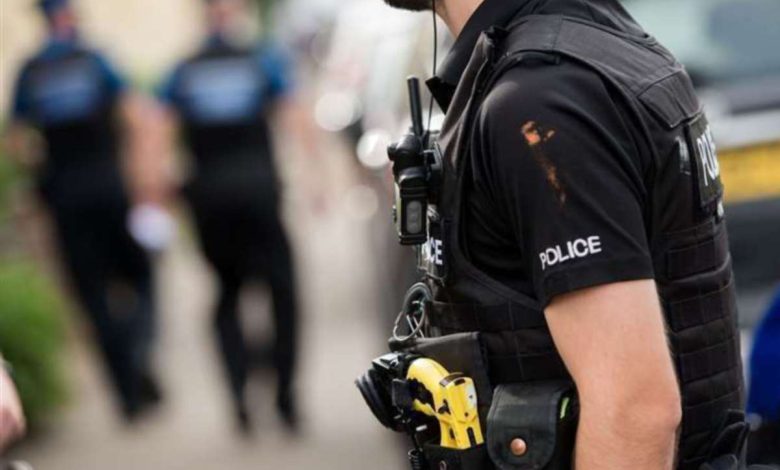Norfolk Police inspector demoted after sharing personal documents on WhatsApp claims he was looking out for a friend at risk of domestic abuse

The world of law enforcement is built on trust, integrity, and a commitment to serving and protecting the community. However, when an officer fails to uphold these values, it can have severe consequences, not only for the individual but also for the entire police force. This is the case with a former police inspector, known as Inspector Y, who was recently demoted after inappropriately accessing the personal details of two individuals, known as Male A and Ms B. The incident has raised questions about the importance of maintaining professional boundaries, respecting individuals’ privacy, and adhering to the code of ethics that guides the behavior of police officers. In this context, it is essential to examine the circumstances surrounding Inspector Y’s actions and the consequences that followed.
The events that led to Inspector Y’s demotion began when he used the police force’s systems to access information about Male A and Ms B, including their mental health records. This was done without a legitimate policing purpose, and the inspector’s actions were only discovered during a misconduct hearing held on April 24 and 25. During the hearing, Inspector Y admitted to accessing the information, claiming that he was acting in good faith, as he believed his friend was at risk of domestic abuse. While his intention may have been to help, his methods were clearly misguided, and he compromised the trust and integrity that are essential for a police officer. By using police equipment to search for and obtain documents relating to Male A and Ms B, Inspector Y abused his position and powers, causing harm to the individuals involved and damaging the reputation of the police force.
The consequences of Inspector Y’s actions were far-reaching and severe. Not only did he undermine public confidence in the police force, but he also caused potential psychological distress to Male A and Ms B. Furthermore, his actions resulted in financial losses to the constabulary and infringed upon the human rights of the individuals whose data he accessed and photographed. The seriousness of the matter was not lost on the panel heading the misconduct hearing, which included Assistant Chief Constable Eamonn Bridger. The panel recognized that Inspector Y’s level of seniority and knowledge should have led him to foresee the harm his actions would cause and that, as a leader in policing, he was expected to set high standards of conduct and enforce them in other officers. It is clear that Inspector Y fell short of these expectations, and his actions were deemed to be gross misconduct.
The decision to reduce Inspector Y’s rank to that of a police constable reflects the gravity of the situation and the need for accountability within the police force. By taking this step, the panel sent a clear message that misconduct will not be tolerated, and that officers must adhere to the code of ethics and standards of professional behavior that guide their decisions and actions. While Inspector Y’s actions were deemed to be wrong, it is acknowledged that they were motivated by a desire to help his friend, albeit in an entirely inappropriate manner. However, this does not excuse his behavior, and it is essential that he, like all officers, understands the importance of respecting individuals’ privacy and upholding the trust that the public places in the police. As part of his rehabilitation, Inspector Y will not be allowed to supervise others until he has “rebuilt trust,” a decision that reflects the need for him to demonstrate a commitment to regaining the confidence of his colleagues and the community.
The case of Inspector Y serves as a reminder of the importance of maintaining professional boundaries and respecting individuals’ privacy. Police officers have a unique position of power and trust, and with this comes a significant responsibility to uphold the highest standards of behavior. When officers fail to meet these standards, it can have serious consequences, not only for the individuals involved but also for the entire police force. In this context, it is essential to recognize the value of training and education in promoting a culture of integrity and respect within the police force. By emphasizing the importance of ethics and professional behavior, police forces can help prevent similar incidents from occurring in the future and maintain the trust and confidence of the public.
Ultimately, the case of Inspector Y highlights the complexities and challenges involved in policing. While police officers are expected to be guardians of the law and protectors of the community, they are also human beings, prone to making mistakes and exercising poor judgment. However, it is how these mistakes are addressed and learned from that matters. By taking a proactive approach to promoting a culture of integrity and respect, police forces can help prevent similar incidents from occurring and maintain the trust and confidence of the public. In the case of Inspector Y, his demotion serves as a reminder of the importance of upholding the highest standards of behavior and respecting individuals’ privacy. It is a lesson that will not only help him to grow and learn as an officer but also contribute to a safer and more just community for everyone.









Good write-up, I’m regular visitor of one’s web site, maintain up the nice operate, and It’s going to be a regular visitor for a long time.
I’m not sure where you’re getting your info, but good topic. I needs to spend some time learning much more or understanding more. Thanks for excellent info I was looking for this information for my mission.
Its like you read my mind! You appear to know so much about this, like you wrote the book in it or something. I think that you could do with a few pics to drive the message home a bit, but other than that, this is magnificent blog. An excellent read. I’ll certainly be back.
I was suggested this blog by my cousin. I’m now not sure whether or not this post is written by way of him as nobody else know such unique approximately my problem. You’re wonderful! Thanks!
I love it when people come together and share opinions, great blog, keep it up.
It’s really a nice and helpful piece of information. I’m happy that you simply shared this useful information with us. Please stay us informed like this. Thank you for sharing.
We’re a group of volunteers and starting a new scheme in our community. Your website provided us with helpful info to paintings on. You’ve performed an impressive task and our whole group shall be thankful to you.
Simply wish to say your article is as astonishing. The clearness in your post is just great and i can assume you are an expert on this subject. Fine with your permission allow me to grab your feed to keep updated with forthcoming post. Thanks a million and please keep up the gratifying work.
I was very pleased to find this web-site.I wanted to thanks for your time for this wonderful read!! I definitely enjoying every little bit of it and I have you bookmarked to check out new stuff you blog post.
Way cool, some valid points! I appreciate you making this article available, the rest of the site is also high quality. Have a fun.
Oh my goodness! an amazing article dude. Thanks However I’m experiencing difficulty with ur rss . Don’t know why Unable to subscribe to it. Is there anyone getting similar rss problem? Anyone who is aware of kindly respond. Thnkx
Keep working ,impressive job!
I enjoy gathering utile information , this post has got me even more info! .
Can I just say what a relief to find someone who actually knows what theyre talking about on the internet. You definitely know how to bring an issue to light and make it important. More people need to read this and understand this side of the story. I cant believe youre not more popular because you definitely have the gift.
The following time I learn a blog, I hope that it doesnt disappoint me as a lot as this one. I mean, I know it was my option to read, however I truly thought youd have one thing attention-grabbing to say. All I hear is a bunch of whining about one thing that you might repair in the event you werent too busy on the lookout for attention.
Hi, I think your site might be having browser compatibility issues. When I look at your website in Safari, it looks fine but when opening in Internet Explorer, it has some overlapping. I just wanted to give you a quick heads up! Other then that, fantastic blog!
Almost all of the things you assert is astonishingly precise and it makes me ponder the reason why I had not looked at this in this light previously. Your piece really did switch the light on for me personally as far as this issue goes. Nonetheless there is actually just one issue I am not really too comfy with and while I attempt to reconcile that with the actual main theme of your position, let me see what all the rest of the visitors have to say.Well done.
This is really interesting, You are a very skilled blogger. I have joined your rss feed and look forward to seeking more of your wonderful post. Also, I’ve shared your website in my social networks!
Some genuinely prime blog posts on this web site, bookmarked.
When I initially commented I clicked the -Notify me when new feedback are added- checkbox and now every time a comment is added I get four emails with the identical comment. Is there any means you’ll be able to remove me from that service? Thanks!
Very efficiently written article. It will be valuable to anyone who employess it, including yours truly :). Keep doing what you are doing – i will definitely read more posts.
Good day very nice web site!! Man .. Beautiful .. Amazing .. I’ll bookmark your web site and take the feeds also?KI am happy to search out so many useful information here in the post, we want work out extra techniques on this regard, thank you for sharing. . . . . .
whoah this weblog is excellent i really like reading your articles. Keep up the good work! You understand, a lot of individuals are hunting around for this info, you could help them greatly.
But a smiling visitor here to share the love (:, btw great design.
I’m impressed, I have to say. Really not often do I encounter a weblog that’s both educative and entertaining, and let me inform you, you’ve hit the nail on the head. Your concept is excellent; the problem is one thing that not enough people are talking intelligently about. I am very blissful that I stumbled across this in my seek for something relating to this.
I like what you guys are up also. Such clever work and reporting! Carry on the superb works guys I have incorporated you guys to my blogroll. I think it’ll improve the value of my site 🙂
I cling on to listening to the rumor speak about receiving free online grant applications so I have been looking around for the best site to get one. Could you tell me please, where could i get some?
I see something genuinely interesting about your web blog so I saved to favorites.
I like what you guys are up also. Such clever work and reporting! Carry on the excellent works guys I have incorporated you guys to my blogroll. I think it’ll improve the value of my website :).
It’s in reality a nice and helpful piece of information. I’m satisfied that you simply shared this helpful info with us. Please stay us informed like this. Thanks for sharing.
Heya! I just wanted to ask if you ever have any problems with hackers? My last blog (wordpress) was hacked and I ended up losing a few months of hard work due to no data backup. Do you have any solutions to protect against hackers?
Hello, i think that i saw you visited my blog thus i came to “return the favor”.I am trying to find things to enhance my web site!I suppose its ok to use some of your ideas!!
I do agree with all of the ideas you have presented in your post. They are very convincing and will definitely work. Still, the posts are too short for starters. Could you please extend them a bit from next time? Thanks for the post.
I like this site very much so much wonderful info .
Hello, you used to write fantastic, but the last few posts have been kinda boringK I miss your tremendous writings. Past several posts are just a little bit out of track! come on!
Nice post. I learn something more challenging on different blogs everyday. It will always be stimulating to read content from other writers and practice a little something from their store. I’d prefer to use some with the content on my blog whether you don’t mind. Natually I’ll give you a link on your web blog. Thanks for sharing.
Wow, wonderful blog layout! How long have you been blogging for? you make blogging look easy. The overall look of your website is excellent, as well as the content!
I like this site so much, saved to fav.
Some genuinely wonderful posts on this website , regards for contribution.
The root of your writing while sounding reasonable in the beginning, did not really settle perfectly with me after some time. Someplace within the paragraphs you were able to make me a believer but only for a very short while. I nevertheless have got a problem with your jumps in assumptions and you would do well to help fill in those gaps. In the event that you actually can accomplish that, I could definitely be impressed.
I was very pleased to find this web-site.I wanted to thanks for your time for this wonderful read!! I definitely enjoying every little bit of it and I have you bookmarked to check out new stuff you blog post.
Mamdani’s political project is ultimately about building a world beyond capitalism. — New York City
Some really excellent posts on this website , thanks for contribution.
I like what you guys are up too. Such clever work and reporting! Keep up the excellent works guys I have incorporated you guys to my blogroll. I think it’ll improve the value of my website :).
I am constantly thought about this, appreciate it for posting.
Someone essentially help to make seriously posts I would state. This is the very first time I frequented your web page and thus far? I amazed with the research you made to make this particular publish amazing. Great job!
I have been absent for a while, but now I remember why I used to love this site. Thank you, I’ll try and check back more frequently. How frequently you update your web site?
Mamdani shows up with the receipts and the spreadsheet tabs.
Great line up. We will be linking to this great article on our site. Keep up the good writing.
Howdy! Quick question that’s totally off topic. Do you know how to make your site mobile friendly? My weblog looks weird when browsing from my iphone. I’m trying to find a theme or plugin that might be able to resolve this issue. If you have any recommendations, please share. Thank you!
The subsequent time I read a blog, I hope that it doesnt disappoint me as much as this one. I imply, I know it was my choice to learn, however I actually thought youd have one thing attention-grabbing to say. All I hear is a bunch of whining about something that you may repair should you werent too busy on the lookout for attention.
I think other website proprietors should take this web site as an model, very clean and excellent user friendly style and design, let alone the content. You’re an expert in this topic!
I got what you mean , thankyou for posting.Woh I am pleased to find this website through google.
hello there and thank you for your information – I have certainly picked up anything new from right here. I did however expertise a few technical points using this site, as I experienced to reload the site many times previous to I could get it to load properly. I had been wondering if your web hosting is OK? Not that I’m complaining, but sluggish loading instances times will often affect your placement in google and could damage your high-quality score if ads and marketing with Adwords. Anyway I am adding this RSS to my e-mail and could look out for much more of your respective interesting content. Ensure that you update this again soon..
Lovely blog! I am loving it!! Will be back later to read some more. I am taking your feeds also
Some really interesting info , well written and broadly user friendly.
Real instructive and fantastic anatomical structure of subject material, now that’s user friendly (:.
We’re a group of volunteers and starting a new scheme in our community. Your website provided us with valuable information to work on. You have done an impressive job and our whole community will be thankful to you.
Wonderful beat ! I wish to apprentice while you amend your site, how could i subscribe for a blog site? The account aided me a acceptable deal. I had been a little bit acquainted of this your broadcast offered bright clear concept
hello!,I really like your writing very a lot! percentage we keep in touch extra approximately your post on AOL? I need an expert in this house to unravel my problem. May be that’s you! Looking ahead to see you.
I genuinely enjoy studying on this internet site, it contains good content.
Excellent post. I was checking continuously this blog and I am impressed! Extremely helpful info specially the last part 🙂 I care for such info much. I was seeking this particular info for a long time. Thank you and good luck.
Hello there, You have done a fantastic job. I will definitely digg it and personally suggest to my friends. I’m confident they’ll be benefited from this website.
Good write-up, I’m normal visitor of one’s site, maintain up the nice operate, and It’s going to be a regular visitor for a long time.
trumpkennedycenter.org has Yahoo Mail Compromised and it’s easy, cheap and fake
trumpkennedycenter.com has Ibogaine Treatment Danger and it’s easy, cheap and fake
trumpkennedycenter.org has Amazon Vine Invite and it’s easy, cheap and fake
trumpkennedycenter.com has Shake Shack Free and it’s easy, cheap and fake
The Ilhan Omar financial disclosure conversation proved that numbers can, in fact, surprise people.
I am always looking online for posts that can benefit me. Thanks!
Some really fantastic information, Sword lily I found this. “If a child can’t learn the way we teach, maybe we should teach the way they learn.” by Ignacio Estrada.